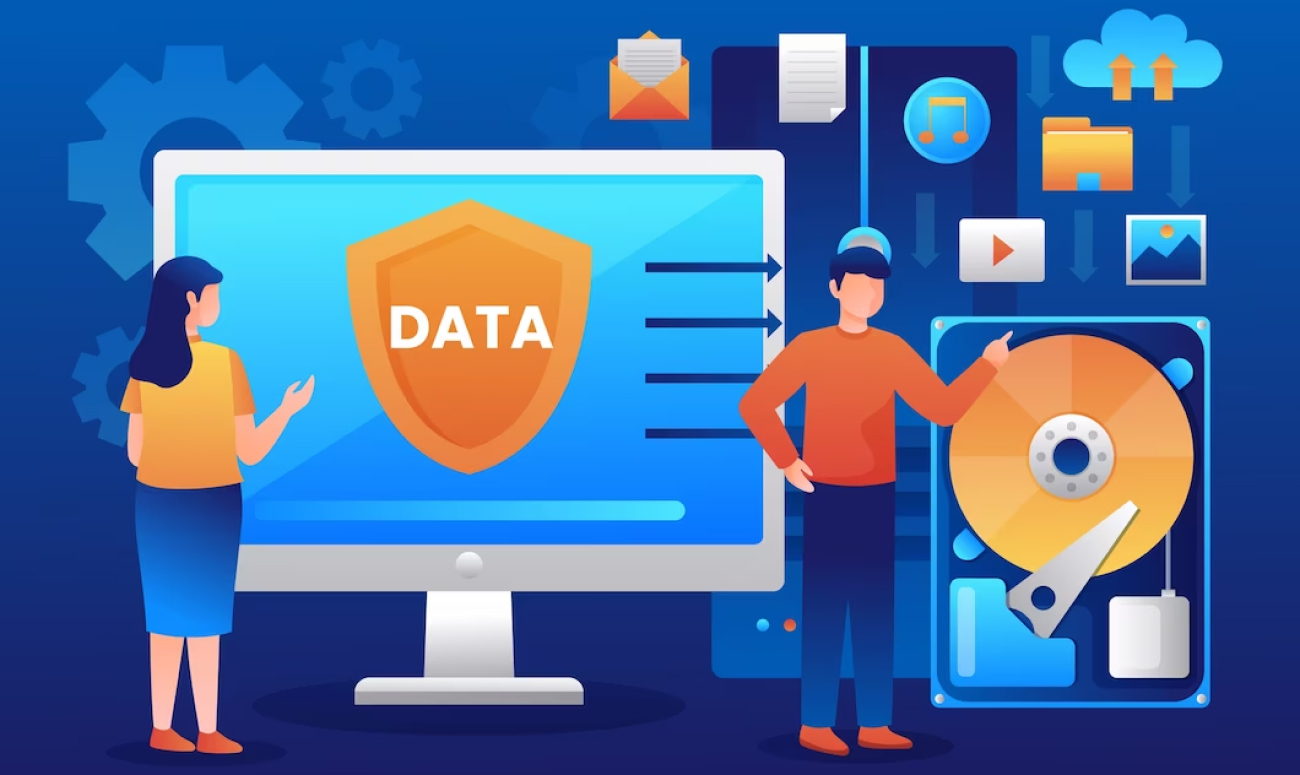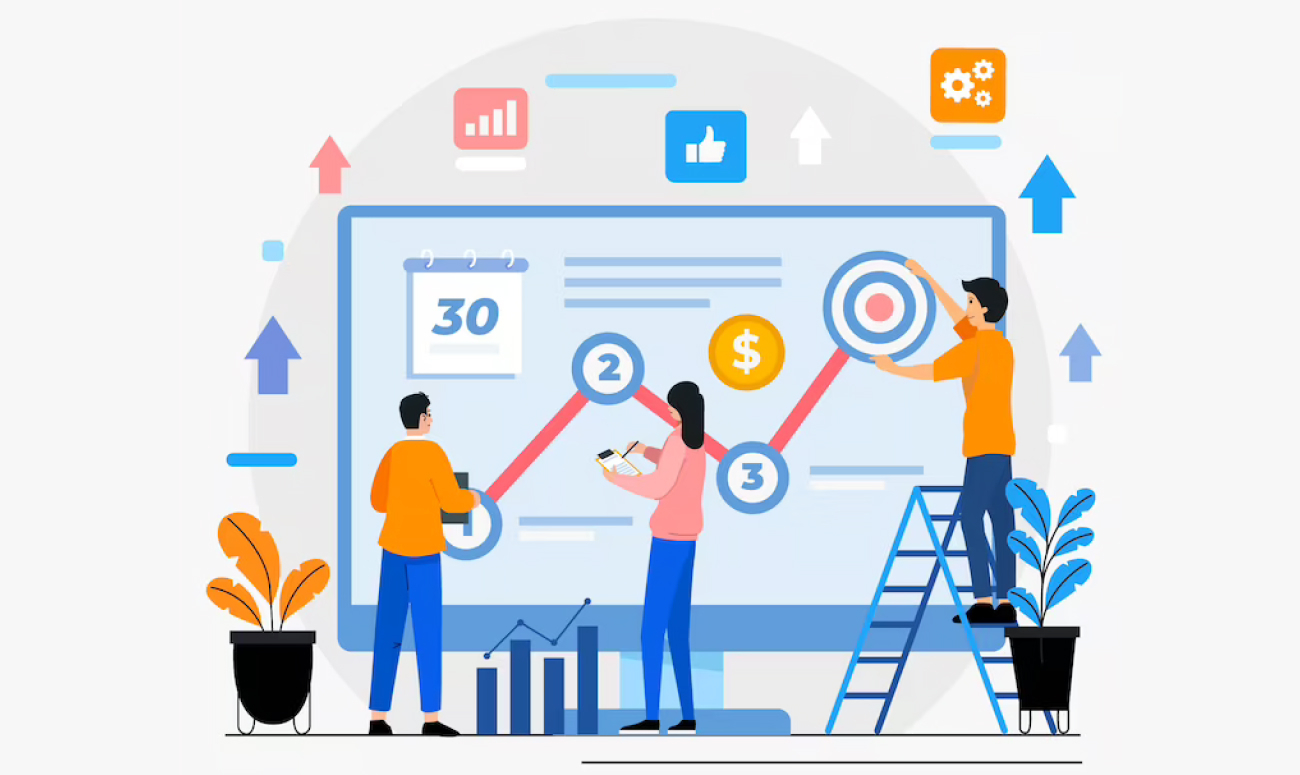
Imagine you have to travel to a distant place but need help figuring out how to get there. You could make the journey by foot, slowly and without any clear direction, or you could opt for a more efficient and optimal means of transportation like a car or plane. The same concept applies to businesses when it comes to managing customer relationships. The more refined and streamlined the business process is, the faster the company can reach its goals. That is where CRM software comes in, helping small businesses create a seamless process for customer relationship management, leading to exponential growth.
In essence, customer relationship management (CRM) software is a tool that simplifies the process of keeping track of customer interactions and data points. Automated data collection and reporting functionalities enable businesses to have a comprehensive overview of their customer’s relevant details. This information helps to create targeted marketing campaigns, develop a personalized experience for the customer, and ultimately build stronger customer relationships.
Several studies have shown that using CRM software can significantly grow small businesses. According to a survey conducted by Software Advice, companies that use CRM software can expect an average of a 41% increase in revenue per salesperson.
This blog will discuss how small businesses benefit from CRM software to drive their growth more strategically and efficiently.
The evolution of CRM software and its relevance to small businesses
CRM software has come a long way, and it is now available in the form of an all-in-one customer relationship management suite. This unified software includes lead capture, contact management, analytics and reporting, automated and email marketing campaigns, social media integration, workflow automation, and more. As a result, small business owners can now use these tools to collect, analyze, and interpret customer data for more effective marketing campaigns.

What is CRM software?
CRM software provider, which stands for Customer Relationship Management software, is essential for businesses looking to improve customer interactions and grow their business. It stores and manages customer data in a centralized location to have better access to updated data by all the business departments.
Other than managing customer interaction, the various benefits include email marketing, project management, marketing automation, sales analytics, deal management, and more.
Additionally, a study by Salesforce found that companies with a mature CRM process experienced a 32% improvement in customer retention rates and a 27% increase in sales revenue. These results are a testament to the transformative power of CRM software in enabling business growth.
For instance, a small online retailer that uses a CRM system collects vast amounts of data that help them better understand their customers and plan the entire sales process. They can measure how long it takes to close sales, track customer feedback, and monitor their online engagement.
This information provides insights that business owners can use to improve customer outreach, enhance business relationships, and identify new growth opportunities. By tracking and analyzing business data in real-time, the CRM platform helps businesses stay ahead of the next learning curve and, ultimately drive long-term success.
CRM Evolution and Relevance
The evolution of Customer Relationship Management (CRM) software has been a gradual one over the years. CRM solution has come a long way since their inception in the 1980s. In the early 1990s, basic CRM technology was introduced as an electronic Rolodex to manage customer data.
With the advent of the internet and cloud computing in the early 2000s, CRM systems evolved to provide advanced features like sales automation, customer segmentation, and marketing automation. In addition, CRM software became even more accessible and affordable, as businesses no longer had to invest in expensive hardware to store and maintain data. The cloud-based software also allowed companies to scale up or down with ease, depending on their requirements.
As technology continued to advance, so did core and CRM capabilities and features in software. For example, in 2010, the emergence of social media led to the inclusion of social in core CRM features, which allows businesses to engage with their customers on social media platforms and track their social interactions to gain customer insights.
In recent years, CRM vendors have been deploying artificial intelligence (AI) and machine learning (ML) algorithms to provide businesses with more sophisticated analyses and recommendations. These have helped companies to automate workflows, forecast future sales well, and optimize customer interactions.
One of the significant advancements in CRM software for small businesses has been integrating multiple software into a single, all-in-one CRM platform. This integration has brought tremendous benefits to small business owners, who no longer have to switch between different software systems to manage their business processes.
An all-in-one CRM platform provides a centralized location for managing customer interactions and streamlines processes like sales, marketing, and customer support. This results in increased productivity, faster decision-making, and a better customer experience.
EQUP is the ultimate all-in-one software that provides a comprehensive set of features for businesses of all sizes. From accounting and invoicing to project management and customer relationship management, EQUP has got it all covered. Its user-friendly interface and intuitive design make it easy to navigate, while its advanced features are designed to streamline your business operations and boost productivity. Whether you’re a small business owner or a large enterprise, EQUP is the go-to software that can help you manage your entire business efficiently and effectively. Give it a try and experience the difference it can make to your business.
Must consider the relevance of CRM software to small businesses. Companies use CRM software to gain insights into customers’ behavior, track leads and sales, manage marketing campaigns, and analyze customer data. These insights help small business owners make data-driven decisions that boost customer engagement, increase revenue, and grow their businesses.
How can CRM software benefit small businesses?
CRM software can help small businesses improve customer relationships, increase sales and revenue, streamline business processes, and maximize profits.
CRM software allows small businesses to track customer interactions and use this data to build a more personal relationship with customers.
The various benefits of CRM software for small businesses include the following:
1. Get to know their customers better
2. Track leads and sales
3. Manage marketing campaigns more efficiently
4. Analyze customer data for insights
5. Make data-driven decisions
6. Increase engagement with customers
7. Boost revenue and grow the business
8. Automate mundane tasks such as sending emails or follow-ups
Integrating CRM software with other business tools and systems

Integrating CRM software with other business tools and systems is becoming increasingly crucial for businesses across different industries. Companies can integrate CRM software with various software tools, including accounting, sales, marketing, and customer support software. The criteria for which software to integrate depends on the particular needs of the business and the industry they operate in.
For example, a transportation company might choose to integrate its CRM software with route planning software, enabling it to optimize its delivery routes based on customer information, such as order volume and delivery frequency.
The benefits of integrating CRM software with other business tools and systems are multiple. Firstly, it eliminates the need for multiple data entry points, reducing errors and saving time. It also enables businesses to gain a more holistic view of their customers, as CRM software can provide insights into customer behavior across different touchpoints. This view can help enterprises to improve their customer engagement strategies and build stronger, more personalized customer relationships.
For example, a study by Aberdeen Group found that businesses that integrated their CRM software with marketing automation software had a 3.1% higher year-over-year customer retention rate than businesses that did not integrate their software. Another study by Nucleus Research found that companies that integrated their CRM software with their accounting software saw an average return on investment of $8.71 for every dollar spent on the integration.
In conclusion, integrating CRM software with other business tools and systems is an effective way to improve business processes, gain a more comprehensive understanding of customers, and further sales opportunities that, ultimately, drive business growth. The type of software to integrate with will depend on each business’s unique needs and industry, with benefits that have been proven to improve customer retention rates and ROI.
Streamlining business processes with CRM software

CRM software can help small businesses streamline their business processes, making managing customer relationships easier and reducing administrative costs. By automating mundane tasks such as sending emails or follow-ups, CRM software can free up time for staff to focus on more important work. It can also provide valuable insights into how sales teams operate and where they can optimize their processes.
For example, a CRM software platform might provide insights into the sales team’s performance, such as how many leads were converted to customers or how long each sale took to close. This information can help businesses identify areas of improvement to increase efficiency and maximize profits.
Automating tasks and workflows
One of the most significant benefits of using CRM is that it allows businesses to automate their tasks and workflows. Automating tasks and workflows frees employee time and reduces errors, leading to more efficient business operations. For example, companies can use CRM to automate tasks like emailing customers(marketing automation), tracking customer interactions, and scheduling follow-up calls. This frees up staff members to attend to other tasks that require a human touch while also ensuring routine, repetitive tasks are completed quickly and accurately.
Examples of automating tasks and workflows include:
Customer data entry and management: Instead of manually inputting and updating customer information, a CRM system can automatically collect, organize, and store data from multiple sources (e.g., website forms, social media profiles, email responses, phone calls, etc.), and keep it up-to-date and accurate.
Task and appointment scheduling: Instead of manually scheduling tasks and customer meetings, a CRM system can automatically assign and prioritize tasks based on their urgency, importance, and complexity and send reminders and notifications to team members.
The benefits of automating tasks and workflows with CRM include the following:
Higher productivity and efficiency: By reducing manual work, and streamlining processes, CRM can help sales teams accomplish more in less time, and with fewer errors.
Improved customer experience: By using automation to deliver personalized, relevant, and timely messages, CRM platforms can help businesses engage with customers in a more meaningful and impactful way, and exceed their expectations.
Better collaboration and alignment: By providing a centralized platform for teams to share information, track progress, and communicate in real-time, CRM can help create a culture of transparency, accountability, and teamwork.
Improving communication and collaboration among teams
Another key benefit of CRM is its ability to improve communication and collaboration among teams, both internally and externally. CRM can help businesses break down silos, reduce miscommunication, and foster a culture of collaboration and innovation by creating a centralized platform for departments to share information, track progress, and communicate in real-time.
For example, a marketing team can use a CRM tool to collaborate with a sales team on lead generation and qualification. This involves sharing data, insights, and feedback on customer behaviors and preferences and aligning marketing campaigns and sales pitches with the customer journey. By collaborating in this way, the marketing and sales teams can ensure that they target the right customers, deliver the right messages, and maximize their conversion rates.
Partner and vendor management: Instead of managing partnerships and vendors manually, businesses can use a CRM system to share information, negotiate terms, and track performance, ensuring they get the best value from their network.
The benefits of improving communication and collaboration with CRM include:
More effective teamwork: By breaking down silos, reducing miscommunication, and fostering a culture of collaboration, CRM can help teams work more effectively and efficiently and achieve better results.
Higher customer satisfaction: By enabling teams to share information, track progress, and respond to customer needs and feedback in real-time, CRM tools can help businesses deliver a more seamless and personalized customer experience.
Improved decision-making: By providing real-time access to data, insights, and feedback, CRM can help businesses make informed and timely decisions and avoid costly errors or delays.
Managing sales and leads more effectively

CRM solutions can help businesses manage their sales rep, and leads more effectively. This includes providing real-time information on prospects, tracking the sales rep and activities through the sales pipeline, and automating the sales process. With a CRM solution, sales teams can stay on top of their leads and sales targets in real-time and reduce their sales cycle.
For instance, B2B businesses rely heavily on lead management to turn prospects into clients. CRM allows the Business Development department to manage leads in real-time, thus gaining more visibility on the strategic leads that may generate revenue.
The benefits of managing sales and leads more efficiently using CRM include:
Increased conversion rates: With better management of leads come better conversion rates.
More accurate sales forecasting: CRM provides real-time data analysis of sales activities, a more in-depth understanding of sales trends, multiple sales pipelines and accurate sales forecasting.
Better collaboration between sales and marketing teams: By sharing real-time updated leads, a CRM can help streamline the cooperation between sales and marketing teams.
Customizing CRM software to meet the unique needs of small businesses

Customization refers to modifying or tailoring software applications better to suit the specific needs of a particular company. Regarding customer relationship management (CRM) software, customization involves adjusting aspects of the software, such as data fields, reporting, and workflow, to better align with the unique requirements of a business.
Some of the features that can be customized within CRM software include the layout and design of the interface, the types of data collected for each customer, the automation of workflows, and the generation of reports and analytics. Customizing integrations with other software applications, such as accounting or email marketing tools, is also possible.
Small businesses can streamline their processes and improve their efficiency by customizing CRM software to meet their needs. For example, companies can create custom dashboards or reports that provide them with the specific insights they need, automate time-consuming tasks, and ensure that they collect pertinent customer data to help inform their marketing and sales strategies.
Ultimately, customizing CRM software allows small businesses to tailor their approach to customer relationship management to align with their unique goals and priorities. That can help them to build stronger relationships with customers, drive sales growth, and enhance their bottom line in the long run.
Best practices for maximizing the power of CRM software for small businesses

CRM software is a powerful tool for small businesses to manage customer relationships and improve sales. First, however, small business owners should follow some best practices to use CRM software effectively.
Regularly updating and maintaining customer data.
Firstly, regularly updating and maintaining customer data is essential to maximize the power of CRM software. Small business owners can use CRM software to collect and store customer data, such as contact information, purchase history, and preferences. By updating this data regularly, businesses can send targeted messages and promotions catering to their customers’ needs.
For instance, imagine a small business owner who uses CRM software to collect customer data. If a customer orders a specific product, the software automatically updates the customer’s data with the purchase details. The business owner can use this data to send targeted messages to the customer with relevant sales or promotions for similar products or services.
Using analytics and insights to optimize performance
Another best practice for maximizing the power of CRM software is using analytics and insights to optimize performance. With CRM software, small businesses can track customer engagement and analyze their behavior to identify trends and make data-driven decisions.
For example, suppose a business owner notices that a product sells well among a specific customer segment. In that case, they can use CRM software to create targeted campaigns that promote that product to that customer segment. This approach ensures that the business owner is leveraging data and analytics to improve sales and boost customer engagement, which significantly impacts the bottom line.
Ensuring data security and privacy

Small businesses also need to consider data security and privacy when using CRM software. In addition, companies need to have measures in place to protect customer data to maintain trust and safeguard against legal liabilities.
For example, businesses can use CRM software to encrypt and protect customer data and give access to only the designated employees who need to use the data for marketing or other business purposes. Small business owners can also provide customers with options to control their data privacy, such as opting out of marketing communications.
Continuously evaluating and improving CRM processes.
Small business owners should continuously evaluate and improve their CRM processes to adapt to changing customer needs and industry trends. This approach helps small businesses stay competitive in their respective markets.
For instance, if a small business owner notices that customers are increasingly using social media to contact the business, they could integrate social media channels into their CRM software to respond to customer inquiries promptly. This integration would result in a more holistic CRM system that offers a seamless experience for the business and the customer.
Staying up-to-date on industry trends and developments
Finally, staying up-to-date on industry trends and developments is crucial for small business owners using CRM software. This knowledge helps business owners understand emerging trends and technologies that can improve their small business CRM and system’s performance.
For example, with new Artificial Intelligence (AI) developments, small business owners can use AI-powered chatbots to automate customer service by handling routine inquiries and freeing up employee time for more complex issues. This technology also provides accurate data handling and automates many sales processes, making it easier for businesses to scale quickly.
In conclusion, small businesses should implement best practices to effectively use CRM software to manage customer relationships and improve sales. Effective small business CRM software strategies include regularly updating and maintaining customer data, using analytics and insights to optimize performance, ensuring data security and privacy, continuously evaluating and improving CRM processes, and staying up-to-date on industry trends and developments. By following these best practices, small business owners can maximize the power of small business CRM and software to grow their businesses and compete in a challenging market.
Overcoming challenges in implementing CRM software for small businesses

CRM software implementation can present several challenges for small businesses, including cost considerations and budgeting, resistance to change and employee adoption, and data management and integration challenges.
Cost Considerations and Budgeting
The major challenge is cost considerations and budgeting for small businesses when implementing free CRM software. Often, the best CRM services and solutions can be expensive, and small business owners need to ensure they are investing in an affordable solution that provides the required functionality. However, with adequate budgeting and cost considerations, a business could save money on a practical solution like EQUP unified free CRM software that leads to cash flow problems.
For instance, small business owners can compare different CRM options to find an all-in-one solution that meets their requirements without breaking the bank. Additionally, some CRM software vendors offer discounts for small businesses or may even provide a free trial period to test out the basic features of the solution before making a purchase decision.
Resistance to change and employee adoption
Resistance to change and employee adoption can be challenging when introducing CRM software to a small business. Many employees may be hesitant to adopt new systems or technologies, which can decrease productivity and cause internal friction. To overcome this, companies need to be clear about how the new system benefits the employees and the business as a whole, provide training and support, and ensure that employees who are active and enthusiastic about the technology are identified and empowered with influence in the organization.
A recent study shows that employee adoption of CRM systems is higher when organizations have a clear implementation plan, provide support and training for employees on the system, and motivate them to use the software.
For instance, businesses can incentivize employees to use the system, such as extra privileges or rewards, when they reach specific goals. Additionally, offering regular training and feedback sessions on the functionality of CRM software will help ensure that employees remain engaged and on board with the process.
Data management and integration challenges
Data management and integration challenges can also be a roadblock for small businesses implementing CRM software. Companies often collect data from various sources, including social media platforms, email, and web analytics, and the challenge lies in consolidating this data and making it accessible conveniently in one location. Integrating this data with CRM software can be challenging and complex.
For instance, businesses should take the time to review their data needs and sources before selecting a CRM vendor or solution. In addition, many top CRM solutions and software vendors also offer integration services with other applications and platforms, so businesses can choose a solution that best meets their data requirements.
Ultimately, successfully implementing a comprehensive CRM and system for a small business requires careful budgeting, effective change management, and streamlined data management and integration. With these considerations in mind, small businesses can implement a comprehensive CRM and solution that delivers tangible benefits, increase productivity, and enhances customer experience.
Exploring the future of CRM software for small businesses and emerging trends.

CRM software has become integral to small businesses in managing customer relations and increasing productivity. With emerging trends in technology, CRM software is expected to evolve to meet the demands of companies in the future.
One of the key trends in CRM software for small businesses is a focus on mobile accessibility. A large percentage of consumers today use mobile devices to engage with businesses. As a result, companies that have mobile-accessible CRM software can stay connected with their clients, respond to their needs, and streamline their customer interactions.
Another emerging trend in CRM software for small businesses is the incorporation of artificial intelligence. AI technology enables businesses to analyze customer data more effectively, offer personalized recommendations, and automate various processes in the customer journey. As a result, AI-powered CRMs can help businesses to work more efficiently and effectively, and provide a better customer experience.
Social media has also become a key driver in the future of CRM software, and its impact will grow even further. Social media platforms like Facebook, Twitter, and Instagram offer businesses a direct communication channel with their customers. CRMs with social media integration can help companies to streamline their social media presence and engagement and identify customer trends and preferences.
Further, security and data privacy has become significant concern for businesses and customers. As a result, CRM software providers are now placing greater emphasis on ensuring the security of customer data. In addition, adopting new data privacy regulations such as GDPR, CCPA, and LGPD has made data protection an essential aspect of CRM software design.
In conclusion, the future of CRM software for small businesses is exciting and full of opportunities. Companies need to stay ahead of the next learning curve by adopting new technology trends and prioritizing the customer experience. Investing in these areas will help businesses achieve higher productivity, better customer engagement, and improved profitability.
Final Thoughts
In sum, CRM software should be noticed by small businesses as it offers significant benefits. Small businesses can manage and track sales activity, establish better customer relationships, automate tedious processes, and access data more efficiently by using the best CRM software tools and solutions. Furthermore, using the best CRM software and technology often leads(lead management) to increased efficiency and profits in the long run. Therefore, investing in and using the right CRM software would be advantageous for small businesses in keeping up with industry standards. For this reason, we recommend researching and trying out different software solutions before choosing the one that best fits your business’s needs. Remember that customer satisfaction is vital to success. Click here to get the best CRM software suitable for small businesses to ensure that your customers leave satisfied with their purchase journey.